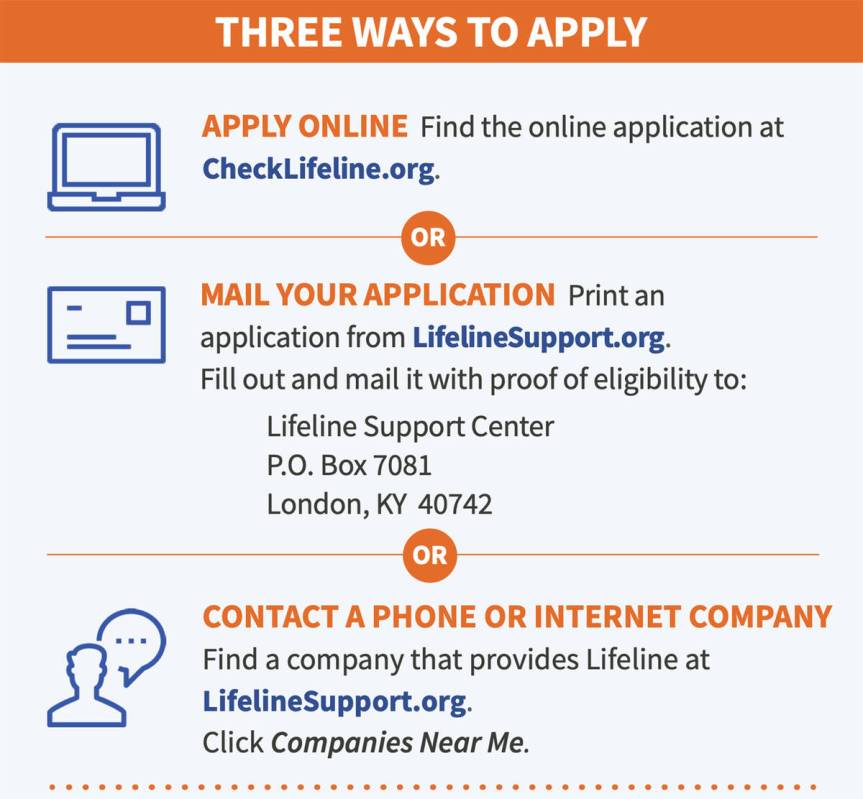
The saying goes, “Communication is key,” but for some low-income individuals and families, keeping in touch with others and staying connected to the outside world sometimes comes at a cost that can prove simply too burdensome to handle.
Bearing this knowledge in mind, the Public Utilities Commission of Nevada is doing all it can to promote Lifeline Awareness Week, which this year runs from Monday, Sept. 20 through Friday, Sept. 24. The purpose of the week-long observance is to highlight the Lifeline Assistance Program offered by the Federal Communications Commission, a program that gives low-income persons the opportunity to receive a discount on telephone or internet service.
“The Public Utilities Commission of Nevada (PUCN) is promoting Lifeline Awareness Week, Sept. 20-24. The Lifeline Assistance Program is a government benefit program supported by the Universal Service Fund that provides a discount of voice or broadband services for qualifying low-income consumers,” a news release from the agency stated. “The PUCN wants residents to ‘stay connected’ and is reaching out to those who need voice or broadband services but can’t afford it. Lifeline helps low-income consumers connect to the nation’s communications networks, find jobs, access health care services, connect with family, and call for help in an emergency. Lifeline provides qualifying low-income consumers with monthly discounts on voice, broadband or bundled voice and broadband service.”
The Lifeline Assistance Program has been in place since 1985 and was originally targeted at providing telephone service to those who need help bearing the cost. However, with the prominence of the internet growing steadily in the intervening decades, by 2016, the Federal Communications Commission had adopted a comprehensive reform and modernization of the Lifeline program to allow qualifying individuals to obtain discounts on internet service as well.
According to the news release, consumers can receive up to $9.25 in federal Lifeline benefits per month, plus an additional $3.50 in benefits from the Nevada Lifeline fund, for a possible combined discount of $12.75 per month. Certain eligible tribal consumers may even qualify for up to $34.35 in federal Lifeline discounts.
“Non-tribal consumers qualify for Lifeline if: (1) they participate in certain federal benefits programs (such as Medicaid, Supplemental Nutrition Assistance Program, Federal Public Housing assistance or the Veterans and Survivors Pension Benefit); or (2) their household income is at or below 135% of the federal poverty guidelines,” the release details. At this time, the federal poverty guidelines are as follows:
■ One-person household: $12,880
■ Two-person household: $17,420
■ Three-person household: $21,960
■ Four-person household: $26,500
■ Five-person household: $31,040
■ Six-person household: $35,580
■ Seven-person household: $40,120
■ Eight-person household: $44,660
■ Households with more than eight persons: Add $4,540 for each additional person
The Lifeline discount is limited to one benefit per household.
“More information on program eligibility and how to apply directly through the National Eligibility Verifier, including links to a list of Lifeline providers in Nevada, is available at www.lifelinesupport.org,” the release detailed. “Downloadable materials about the Lifeline program are available on the ‘Community Outreach’ page, including ‘How to Apply’ fact sheets in English and Spanish as well as for tribal consumers. For additional Lifeline application support, consumers also may contact their provider of telephone or internet service, including wireless providers. If your wireless provider is a designated Eligible Telecommunications Carrier, it should offer the Lifeline discount. Check the PUCN’s website to see if your provider is a designated Eligible Telecommunications Carrier.”
More information about the program can also be found at www.usac.org/lifeline
Contact reporter Robin Hebrock at rhebrock@pvtimes.com
Author’s Note: This article was updated to reflect the correct dates for Lifeline Awareness Week. The PUCN news release inaccurately reported the dates.